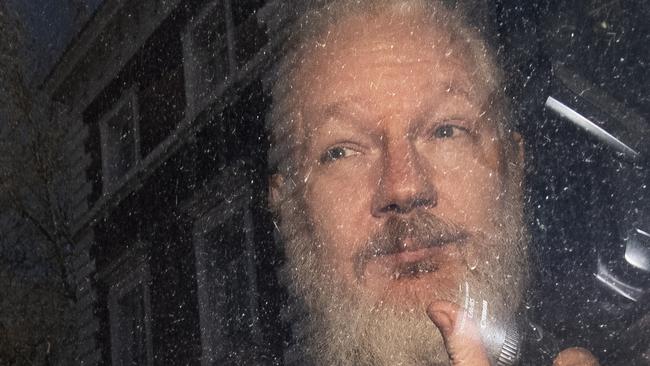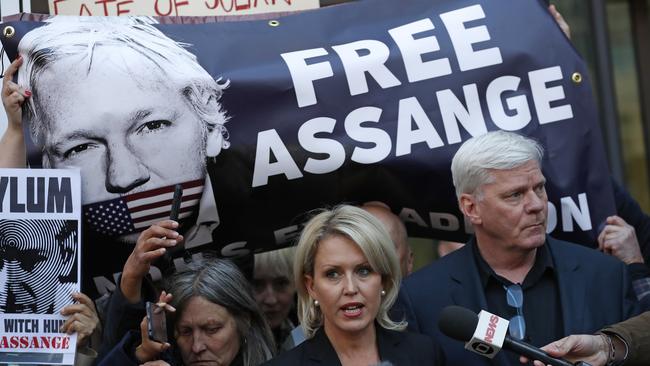Donald Trump distances himself from Julian Assange; Clinton says he must answer
As Donald Trump distanced himself from the Julian Assange arrest, Hillary Clinton weighed in.

Donald Trump has distanced himself from WikiLeaks after the arrest of Julian Assange as the US released an indictment charging the Australian with conspiracy to disclose information capable of causing ‘irreparable injury’ to the US.
When asked about Mr Assange’s arrest in London, the president said: “It’s not my thing. I know there is something having to do with Julian Assange. I’ve been seeing what’s happened with Assange and that will be a determination, I would imagine, mostly by the Attorney-General. So, he’lI be making a determination. I know nothing really about him. It’s not my deal in life.”
But Hillary Clitnon said the WikiLeaks founder needs to “answer for what he has done.”
The 2016 Democratic presidential nominee and former secretary of state weighed inon Assange at an event in New York.
WikiLeaks’ publication of Democratic emails stolen by Russian intelligence officers during the 2016 election season hurt Clinton’s presidential campaign.
The US has charged Assange with conspiring with former Army intelligence analyst Chelsea Manning to break into a classified government computer at the Pentagon.
“The bottom line is that he has to answer for what he has done,” Clinton said.
“I love reading those WikiLeaks”
Mr Trump repeatedly praised WikiLeaks during the 2016 election campaign for its role in disclosing Russian-hacked Democratic Party emails aimed at embarrassing Mr Trump’s opponent Hillary Clinton.
“WikiLeaks shows how crooked the whole thing is,” Mr Trump said in 2016. “I love reading those WikiLeaks.”

The US indictment, which was unsealed yesterday but dated May 6 2018, accuses Mr Assange of a single charge of conspiracy to commit computer crimes. It carries a jail term of up to five years in prison, although the US may choose to add extra charges in the future.
The indictment alleges that the Australian founder of WikiLeaks conspired with former US Army intelligence analyst Chelsea Manning to illegally access a massive trove of classified documents on US diplomatic and military activity around the world.
It alleges that Assange aided Mr Manning with “cracking a password stored on US Department of Defence computers” that contained classified documents and secrets.
“Manning, who had access to the computers in connection with her duties as an intelligence analyst, was using the computers to download classified records to transmit to WikiLeaks,” the indictment said. “Cracking the password would have allowed Manning to log on to the computers under a username that did not belong to her. Such a deceptive measure would have made it more difficult for investigators to determine the source of the illegal disclosures.”
The indictment alleges that Mr Assange worked with Ms Manning to access a massive amount of classified documents in 2010 and 2011 including around 90,000 reports on the war in Afghanistan, 400,000 reports on the Iraq War and 250,000 US State Department cables.
It said that Ms Manning and Mr Assange worked to access the classified material knowing that it “could cause irreparable injury to the United States or be used to the advantage of a foreign nation.”
Arrest after seven years
Mr Assange was arrested in London yesterday at the Ecuadorean embassy where he had spent seven years in refuge, fearing he would be arrested and extradited to the US if he left.
The arrest was made possible when Ecuador said it would no longer grant diplomatic protection for Mr Assange. Extradition hearings on May 2 and June 12 will determine whether he will eventually be sent to the US to face the charges against him.
Mr Assange’s US-based lawyer Barry Pollack said the US allegations against his client “boil down to encouraging a source to provide him information and taking efforts to protect the identify of that source.”
“Journalists around the world should be deeply troubled by these unprecedented criminal charges.”
The US attempt to prosecute Mr Assange will trigger debate about whether his activities are criminal or are protected under the First Amendment involving journalistic freedoms.
Although the US charges relate to Mr Assange’s alleged involvement in the first massive dump of WikiLeaks documents in 2010 and 2011 Wikileaks was also embroiled in controversy during the 2016 election.
In 2016 WikiLeaks received and published emails from leading Democrats after Russia hacked the Democratic National Committee in a bid to uncover information which might damage Clinton.
Mr Trump welcomed the disclosure of the hacked emails and joked that he wished Russia could find the thousands of emails which Mrs Clinton had sent from her personal server in the so-called Clinton email scandal.
An indictment against 12 Russians last year described WikiLeaks’ role in publishing hacked emails in the run-up to the 2016 presidential election. The indictment said WikiLeaks had worked to coordinate the release of information but did not accuse the organisation of soliciting the emails or working with Russians.
In April 2017 the then-CIA Director Mike Pompeo declared Wikileaks as a ‘non state hostile intelligence service’ which posed a threat to US security.
“I’m glad to see the wheels of justice are finally turning when it comes to Julian Assange,” Republican Senator Lindsey Graham tweeted. “In my book, he has NEVER been a hero. His actions — releasing classified information — put our troops at risk and jeopardised the lives of those who helped us in Iraq and Afghanistan.”
with AP
Cameron Stewart is also US Contributor for Sky News Australia




To join the conversation, please log in. Don't have an account? Register
Join the conversation, you are commenting as Logout